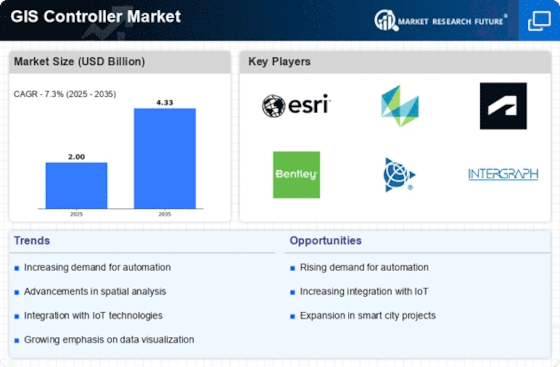Market Trends
Key Emerging Trends in the GIS Controller Market
Because of the coordination of ML and AI functionalities, the market for GIS controllers is going through intense changes. This peculiarity enables GIS chairmen to dissect, cycle, and render choices concerning complicated spatial information, consequently bringing about results that are more exact and viable. Makers are enough changing their advancements.
As cloud-based arrangements build up some momentum — giving versatility, flexibility, and openness — the market for GIS controllers picks up speed. These arrangements empower remote access and capacity of geospatial information, reforming how associations regulate and disseminate geographic data. They work with cooperation and the trading of information progressively, in this way upgrading the dynamic cycles of various clients.
The ascent of interconnectivity is causing a significant change in the GIS controllers’ market, as these regulators are designed to lay out associations with a huge number of gadgets and sensors, consequently laying out a sweeping information biological system. By using this interconnected philosophy, GIS controllers are fit for gathering information from a great many sources, consequently enlarging their ability to give geological data progressively.
GIS controllers with easy-to-understand points of interaction and openness highlights are acquiring portion of the overall industry, as makers endeavor to deliver GIS innovation open to a more extensive segment, including people lacking specialized mastery. This pattern envelops the making of easy-to-use controls, natural connection points, and further developed perception apparatuses, all of which effectively increase the availability of GIS controllers for experts in assorted areas.
Because of the rising spotlight on natural and supportability factors, the market for GIS controllers is persevering through significant development. The improvement of these regulators is centered around working with natural protection and checking, with a particular accentuation on accuracy farming, ranger service the executives, and environmental change research. Thus, economical assets the board will be gotten to the next level.
A shift is happening in the market toward open-source GIS arrangements, which give flexibility, moderateness, and customization choices. As associations look for options in contrast to exclusive arrangements with an end goal to lessen expenses and improve the flexibility of GIS innovation to address explicit issues, this pattern is getting some momentum.
The market for GIS controllers is affected by the rising requirement for portable GIS applications, explicitly those intended for cell phones and tablets. This arising peculiarity explicitly targets field experts who require portable admittance to geographic information, working with cooperation, independent direction, and ongoing information obtaining from any geological area; therefore, it intensifies their general productivity.
Huge improvements are happening on the lookout for GIS controllers, for example, the fuse of man-made intelligence and cloud-based arrangements, an accentuation on easy-to-understand interfaces, and a guarantee to supportability. These patterns are demonstrative of the changing requests of areas and professionals who utilize GIS innovation. It is guessed that as innovation advances, the market will go through extra development and change.


















Leave a Comment